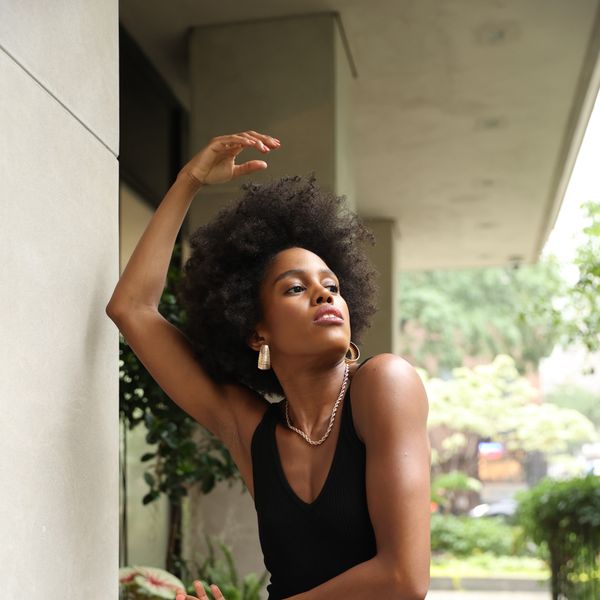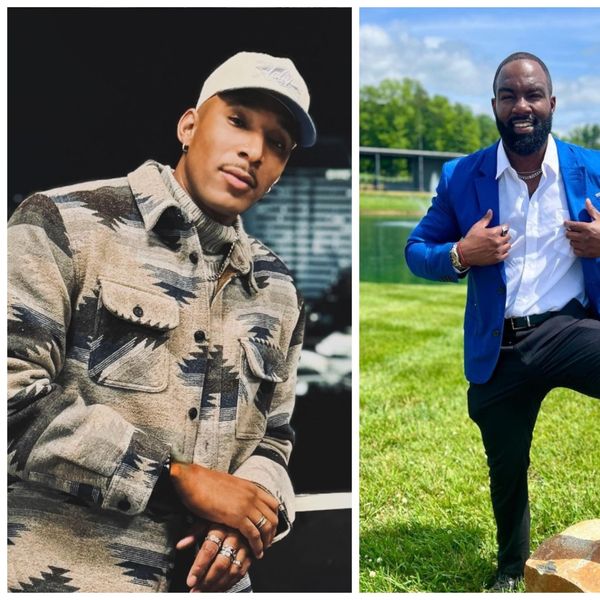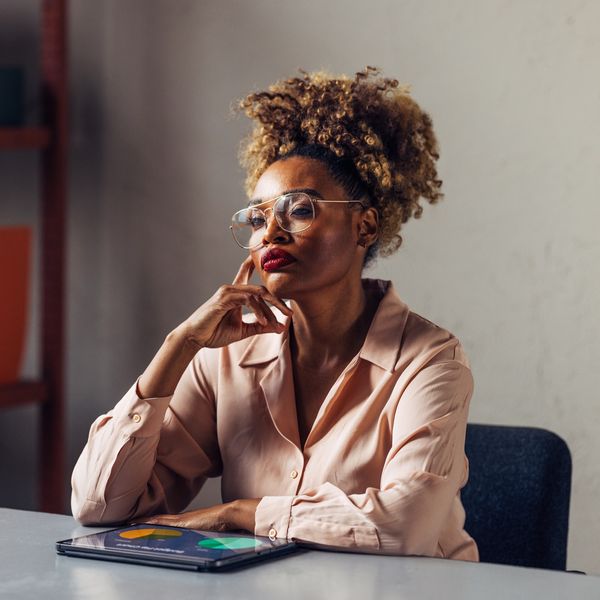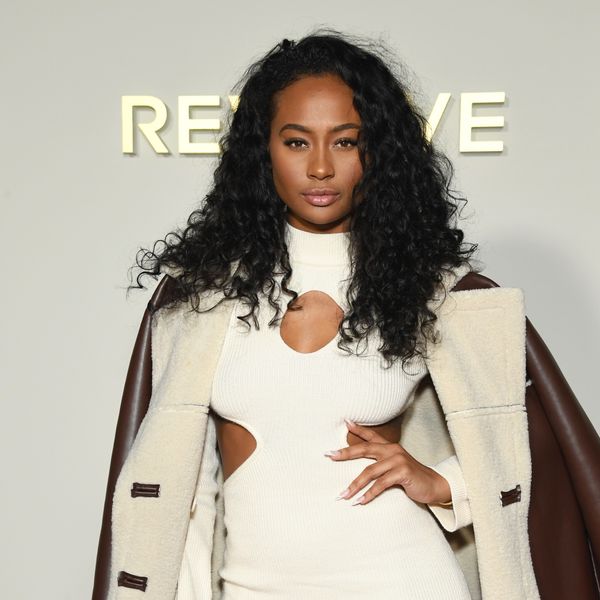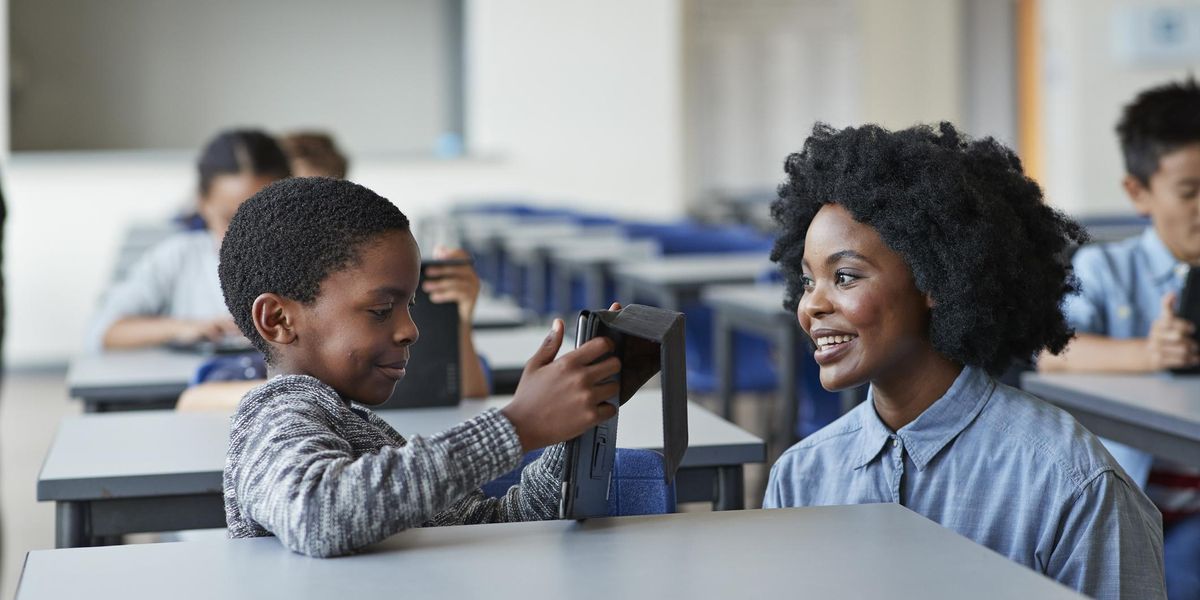
Real-Life Teachers Share Their 'Abbott Elementary' Experiences
There’s an embarrassment of riches that comes with being a fan of ABC’s hit comedy Abbott Elementary. The show, which stars Quinta Brunson as Janine Teagues, Sheryl Lee Ralph as Barbara Howard, Tyler James Williams as Gregory Eddie, and Janelle James as Principal Ava Coleman, is about a group of mostly Black educators at a predominately Black elementary school in Philadelphia and has captured audiences for its tender, hilarious, and lighthearted depiction of what it's like to be a Black teacher to young Black students.
For many real-life Black educators watching the series, the show often reflects their real experiences dealing with the intersections of poverty and Blackness and all the other stuff that comes with teaching in America.
xoNecole reached out to several Black teachers to ask whether the beloved sitcom reflects what actually goes on in the classroom.
What are your thoughts on the show 'Abbott Elementary'?
Ms. Ora (1st Grade Teacher): I love Abbott Elementary! This is my first year as a teacher, but I worked in a D.C. middle school through City Year for the 2021-22 school year. There are a lot of little moments or little jokes that are made on the show that resonates with my experiences this year and last school year.
Mr. Wes (Middle School Teacher): I really enjoy the show, and you can really tell that they work closely with educators to make sure that they’re showing it in a truthful way. Even though it is a lighthearted show, some of the parts of it still trigger me in ways I don’t expect it to. Like the one teacher who’s teaching the combo 2nd and 3rd-grade class, the scenes of chaos in that class make me cringe like I’m watching a horror movie. I think Janine is also either an astonishingly talented teacher at her age or has the chillest second graders ever. I teach middle school, but from what I see/hear about from other teachers and my firsthand experience covering other classes, let’s just say I have a lot of questions (laughs).
What does the show get right about being a Black educator in a school located in a Black working-class neighborhood?
Ms. Ora: The students and the relationships the students have with the teachers are extremely accurate. It's hard to put into words what exactly is so distinct about it, but there is something different about how Black educators relate to their students who are Black (or of color) that the show is able to capture.
Ms. Destiny Stone-King (Middle School Teacher): It definitely highlights the joy of getting to relate to your students culturally and giving them that sense of security knowing that they have educators who look like them and have cultural similarities.
Which character do you most relate to?
Ms. Ora: I feel very much like a Janine. I'm new to education, I'm still learning, and sometimes I find myself wanting to fix more than I'm capable of fixing on my own. I also have my own Ms. Howard that I look up to at my school (who also happens to be a kindergarten teacher).
Mr. Wes: Definitely Gregory. I feel like I grew up in a strict, military household and I’ve learned how that type of instruction/behavior management does not always work and can sometimes even be counterproductive. I’ve learned how to let loose and embrace my ridiculous/fun side more and more. It took me a while to realize that the attitude and vibes I bring into the class affect how the students behave. Which seems obvious, but when you’re stressed out all the time because you didn’t have time to plan as much or you’re behind on grading, you’re not always thinking about how that affects your presence in the classroom. I see Gregory learning that, and that scene where he lets go and dances are one of my favorite moments in the whole show.
Anonymous(Pre-K & 4th Grade Teacher): This is a hard pick for me but I think I’m somewhere between Barbara and Janine. I have Barbara’s energy exactly where she and I are mostly calm and know what to expect from people, but I have a little bit of Janine’s optimism and desire to evoke change. Sometimes I think that Janine is doing too much and she does need to learn how to separate her identity from her job or else she’ll end up burnt out. But I’ve found a lot of older educators can be set in their way of doing things, like Barbara, and I don’t subscribe to that method either. If there is a problem, I like to explore solutions to the problem instead of accepting that some things just are the way that they are. So I want to change things within my power, but I’m not as unrealistic as Janine.
What made you want to get into education?

Johnny Greig/ Getty Images
Ms. Ora: Honestly, I'm not sure. I started my undergraduate degree with every intention of going into law or some form of international relations, but as I neared the end of my degree I found myself being interested in teaching ESL at some point in my life. Every time I thought about teaching, I got really excited--I loved the idea of teaching the fundamentals of language, which is what made me want to teach early elementary in particular.
Ms. Stone-King: It’s literally in my blood. My grandma, grandpa, and parents were all teachers. As an independent artist who is pursuing my career as a singer, songwriter, and recording artist, I like that I can mix my passion for music with education and still have time in the evenings and weekends to work on my craft. I also specifically wanted to teach in predominantly Black schools because I only had one music teacher who looked like me from elementary up to college, so I wanted to show students that they can do this too if they want.
Ms. Chelsea (Pre-K Teacher): My grandmother was a teacher. She was actually a principal for the school for the deaf and the blind in Jamaica. She was a big leader in being more welcoming and accepting of those with exceptionalities in Jamaica and even when she left, [she] carried on those values to raise me in the U.S. with my mom. She was also my Pre-K teacher when I was little which was fun. I also am an only child and always loved taking care of kids and playing with kids. When I was in high school, my neighbor’s kids would knock on my door after school for me to play with them and my mom would be like, “You know she’s 16, right?” but we all didn't care. I loved spending time with them! So I decided to go into education because I just felt happy when I was working with kids and watching them grow and learn something new.
What’s something you hope the show touches on?
Ms. Stone-King: I hope the show has an episode about the arts!
Mr. Wes: I really hope they get into teacher unions. I’m very pro-labor and pro-union, but many of these establishment unions in large cities have become closer to school districts than a united labor force; bureaucracy, power trips, and just general apathy are what I feel like I get sometimes from my union. At a higher level, there’s obviously the tension between districts and unions, but I think the real intrigue is going deeper into what actually goes on in teacher unions. If a teacher has a serious issue, how are they helping address it? Many unions do great work but I feel that others need to take a serious look in the mirror and assess how they are actually helping the educators that they represent.
Ms. Kaitlin (4th Grade Teacher): I understand Ava blackmailed her way into the principal role, but let’s talk about how Gregory, who I adore, anticipated becoming principal without ever having taught. Ava drives those teachers crazy, but what would drive a teacher even crazier is being led by someone who has never set foot in a classroom. Let’s bring that back up, please! I want to know why Gregory thought principal-ing was something in his near future.
What would you like fans of 'Abbott Elementary' to know about the realities of working as a Black educator that they might not glean from the show?
Ms. Stone-King: Teaching is already an emotional investment, but especially being a Black educator working with Black students, you feel a greater responsibility to protect them but also expose them to possibilities that they’ve been conditioned to stay away from because of the color of their skin.
Anonymous: People will expect you to volunteer your time because we work in a caring profession, and then they’ll make you feel bad for asking about pay. This means that they’ll expect you to work during your lunch, come in after school, stay after school, and work late nights for free and not even suggest payment for these services. For teachers especially, if you take the day off you have to leave lesson plans for the person covering your classroom. They will likely call you on your off day and think you’re in the wrong for not answering the phone (if you don’t).
People know exactly what children need to learn and yet you’ll still need to advocate for your children especially to receive those support. Smaller class sizes, flexible seating, and empirically-based curriculum/technology do not come cheap or easily. The episode where they had additional money in the budget and Janine wanted a computer for the students so they could have a comparable experience to the charter was very real, and then for that money to get snatched up to address the rat infestation was even more tragically accurate.
Some things in the show seem too terrible to be true. I want fans to know that they are based in reality.
What are ways for the public to support Black educators and their students?
Anonymous: Please fund your schools, and vote for people who will fund the schools adequately. The money is plentiful and the real issue is that they are using it for reactive services versus proactive (education). Be involved in your local school district (volunteer, show up to after-school functions, and be an active member of the school boards). I mean this, especially for Black people and people who are invested in issues that impact Black people. The best way to support Black educators and our students is to show up.
As I said earlier, everyone relies on schools for a number of resources: dental and vision exams, therapy (occupational, physical, and emotional), parenting support, and more. Doctors will write prescriptions to parents to bring their child to school for evaluations, versus using outside agencies/referrals to evaluate children due to financial restraints. This is the foundation of our society for many families and it needs money and support in order to help our neighborhood grow.
Ms. Kaitlin: To voice Janine, the best way to support Black educators is by building community with them. The first Black working-class school I had taught in was in Bowie, MD, and we thrived from a beautiful balance of parent, teacher, and faculty involvement. Parents regularly helped with school lunches and special event days, teachers collaborated often, and faculty gave us helpful feedback and resources. It was an idyllic school setting, and the students absolutely thrived there. Another way to support a Black educator is by giving them money.
Ms. Rhyanna Morgan (2nd Grade Teacher): VOLUNTEER!!! Many public schools are short staffed and we need people that look like us helping us. Students need to see adults pitching in to take care of schools and the people in them. Make your voices heard, know what is going on at your neighborhood school, keep tabs on the school boards of Black and Brown cities. These things keep the community involved and keep schools safe and keep children with the education they deserve.
What advice do you give to any Black person who might be inspired to become an educator because of 'Abbott Elementary'?
Anonymous: I would advise anyone inspired to become an educator because of Abbott Elementary to go work/volunteer in a public school so they can learn the profession before committing to it. Abbott isn’t lying about how much is required of teachers. Teachers aren’t just teaching math, but they are also teaching about social skills, managing emotions, and now they’re taking temperatures. I would also advise anyone who wants to work in education to spend some time working with children with disabilities at specialty schools and settings. I want anyone aspiring to be an educator to familiarize themselves with special education and the research pertaining to how it impacts Black and brown children differently than it does white children.
Ms. Kaitlin: Care for your Black students as the teachers of Abbott Elementary care for theirs. In predominantly Black working-class schools, often educators and faculty police their students instead of care for them. The reasons are many-fold, but I hope that they are unlearned swiftly. I radically (at least it felt radical in my D.C. school), refused to raise my voice at my students. I had come out of an abusive relationship and learned that yelling was not a natural form of communication. This was something I had translated to my co-teacher, but she was not on board with the practice, so much so that she, a fellow Black educator, claimed that these students were “from the gutter,” and thus deserved to be spoken that way. They were nine. I don’t know how you look at a nine-year-old child and see them that way, or speak to them with such animosity. The way the teachers of Abbott Elementary speak to and care for their students should be replicated in schools everywhere.
Ms. Chelsea: Do your research on the schools you want to work at, ask to come in and observe. See how you feel in the space. Don’t be quick to run from the job. (I say many times a day I’m going to quit but I’m not serious, haha, I love what I do even when it's hard.) Reach out to me if you want to observe or see what different classrooms look like. I’m happy to share. I’m big on diverse children’s literature and can share my recommendations, etc.
Let’s make things inbox official! Sign up for the xoNecole newsletter for daily love, wellness, career, and exclusive content delivered straight to your inbox.
Feature image by Klaus Vedfelt/ Getty Images
- How Valencia Clay Is Redefining What It Means To Be An Educator ›
- Black Women On How They Found The Therapist That Was ‘The One’ ›
- 8 HBCU Alums On How School Shaped Their Lives ›
- 'Abbott Elementary' Proves That TV Can Build Community ›
- To Be Young, Gifted & Black: 5 Black Educators On The Power Of Representation In The Classroom ›
How This New Bond Repair Line Transformed One Mother's Postpartum Shedding Into The Ultimate Curl Comeback
This article is in partnership with SheaMoisture
For Crystal Obasanya, her wash day woes came shortly after her son did. The beauty and lifestyle content creator had been natural for years, but during postpartum, she quickly learned about one reality many mothers can relate to experiencing: postpartum hair loss. “Sis had thinning hair. Sis had split ends,” she shared about her hair changes in a Reel via xoNecole.
Over a year into her postpartum journey, Crystal explained she also had dry, brittle hair, noting that keeping it hydrated before pregnancy had already been “a task.” The 4C natural recalled going from thick hair during pregnancy to a thin hairline due to postpartum shedding as “devastating.” When it came to strengthening and revitalizing her hair, the new SheaMoisture Bond Repair Collection was just the thing she needed to elevate her damaged coils to revive and thrive status and get them poppin' again.
SheaMoisture is providing us with the cheat code for transforming dry and damaged strands into thriving and deeply nourished crowns. By unveiling their 4-step hair system, the SheaMoisture Bond Repair Collection is equipping you with the tools to reverse signs of hair damage caused by protective styling, heat, and color and is uniquely formulated for Type 3 and 4 hair textures.
The haircare system revives damaged natural hair by repairing and rebuilding broken hair bonds through a game-changing combination of HydroPlex Technology and AminoBlend Complex, a unique blend of fortifying amino acids formulated specifically for curly and coily hair. Scientifically proven to reduce breakage by 84% and make your hair six times stronger (vs. non-conditioning shampoo), the collection infuses your hair with the nourishment it craves and the strength it deserves.
All five products of the SheaMoisture Bond Collection are infused with natural strengthening ingredients like Amla Oil and fair-trade shea butter. The collection consists of the 4-step breakage-fighting Bond Repair system, as well as the Bonding Oil.
“When trying it out, I quickly noticed that my hair felt revived and renewed, and my curls were so hydrated,” Crystal said while using the Amla-infused Bond Repair Leave-In Conditioner. “I also felt my hair strands were stronger.” So much so that the influencer felt brave enough to get her hair braided shortly thereafter. “I can definitely say that I will be keeping it in my hair wash routine,” she added in the caption of her Reel about her positive experience using the products.
SheaMoisture Bond Repair Collection is making bond-building a key player in your wash day routines and the purveyor of life for thirsty manes. Because who doesn't want stronger, shinier, happier hair?
Step One: Bond Repair Collection Shampoo
Rejuvenate your hair with SheaMoisture Bond Repair Shampoo, your go-to solution for luscious locks. Packed with hella hydration power, this shampoo adds moisture by 60% while removing buildup without stripping your strands. This shampoo gently cleanses impurities while significantly enhancing shine, smoothness, and softness.
The Bond Repair Collection Shampoo is the first step in the 4-step Bond Repair system, all of which are powered by the uniquely formulated AminoBlend, and HydroPlex, SheaMoisture’s technology that rebuilds hair strength at its core.
Step Two: Bond Repair Collection Conditioner
Tailored to repair styling damage, this creamy conditioner locks in 12x more moisture than standard non-conditioning shampoos, boosting damaged hair strength by 1.5x with significantly less breakage. The creamy SheaMoisture Bond Repair Collection Conditioner deeply hydrates, enhances manageability, and leaves your hair looking healthier and shinier.
Step Three: Bond Repair Collection Masque
This Ultra Moisturizing reparative masque is a moisture-rich game-changer for those dealing with the aftermath of hair damage caused by styling. The SheaMoisture Bond Repair Collection Masque delivers 13 times more moisture compared to non-conditioning shampoos, ensuring your hair feels nourished and soft. Designed to repair and rejuvenate, this masque significantly strengthens damaged hair — making it twice as strong while reducing breakage.
Step Four: Bond Repair Collection Leave-In Conditioner
Elevate your curl game with SheaMoisture’s Bond Repair Collection Leave-In Conditioner. Lightweight and hydrating, the Bond Repair Leave-In Conditioner provides 12x more moisture than non-conditioning shampoos and tames frizz with 24-hour humidity control. Designed to define curls and coils, the leave-in conditioner enhances softness and shine allowing you to detangle effortlessly.
Bonding Oil
The SheaMoisture Bond Repair Collection Bonding Oil is a multitasking all-in-one formula that acts as a heat protectant and provides the hair with moisture, strength, shine, damage protection, and intense nourishment. This lightweight oil not only offers 24-hour frizz and humidity control but also fortifies your tresses, making them up to 5 times stronger with significantly less breakage.
Featured image courtesy
In today’s economy, we’re always looking for ways to stretch every dollar. However, the allure of new gadgets, trendy clothes, and the latest dining spots can often lead to impulsive spending. An iced latte here and an Uber Eats delivery there, topped off by a spontaneous online order can add up over time.
For those seeking to curb frivolous expenses and adopt a more mindful approach to their finances, participating in a no-spend month could be the solution to gaining control over their spending.
What is the No-Spend Challenge?
The no-spend challenge is a personal finance exercise where individuals commit to not spending money on non-essential items for a specific period. This could mean cutting off a subscription service, limiting your nights out for drinks, pulling back on online shopping, and holding off on big, spontaneous purchases to see how much you’d save over the month. The challenge encourages participants to evaluate their spending habits, identify areas of unnecessary expenditure, and redirect their financial focus toward savings and debt reduction.
This spending requires one to differentiate between needs and wants, with the base necessities being food, transportation, housing, essential bills, and medical/mental health expenses.
Preparing for a No-Spend Challenge
When embarking on a no-spend month, proper preparation is key to ensure you make the most out of the experience.
Financial expert and founder of The Frugal Feminista, Kara Stephens, says that having a compelling “why” can serve as a motivator to endure the ups and downs of the challenge, especially if it's your first time. “Have a clear idea of what your goals and outcomes are for the challenge. Do you want to be grateful for what you have? Do you want to save a certain amount of money?” she tells xoNecole. “Know what's going to be your ‘after-no-spend challenge' sustainability plan because we're hoping that your habits and your perspective on spending are changing and that you find a way to make that a part of your life after the challenge.”
One of the initial catalysts for the recent popularity of the no-spend challenge is to combat “revenge spending.” This spending habit, triggered by the “life is short” reality of the pandemic, has caused many of us to want to make up for lost time or missed experiences, which can lead to reckless financial decisions and jeopardize future stability.
Because of this, Stephen advises us to reframe our thinking around revenge spending to avoid putting our financial future at risk.
“Try and shift your perspective on revenge spending and say, yes, I want to live my best life, but how can I spend it responsibly?” she says. “How can I revenge spend on a budget? How can I remove the idea of revenge spending from my lexicon and just live well and plan systematically so it doesn't take away from my future financial goals?”
Benefits of A No-Spend Month
Taking part in a no-spend month has a number of benefits, one of which is the self-awareness and gratitude you gain by cutting out non-essential purchases. “You’re more financially self-aware because you're only thinking about what you deem as essentials,” Stephens says. “It can also make you more resourceful because you have to use what you have in your home, rather than going out and shopping.”
Those who take part in the challenge often find they become more intentional with their purchases, distinguishing between what they truly need and what they can do without. The money saved over this course of time can then be redirected towards paying off debt, building an emergency fund, or being put into a sinking fund.
Due to the rigid nature of the challenge, Stephens says that it’s important to have a sustainable framework to follow the no-spend challenge to avoid reverting to old habits. “It can be like "yo-yo dieting,” she explains. “If you were very strict for a certain period, but didn’t create any type of habit or change of mind to continue with it, you could resort back to revenge spending, ironically.”
Things to Keep In Mind
While it may seem like just another financial trend, taking part in a no-spend month can provide precious data about not just how much money you spend but also your mindset and relationship around money. You can observe how your feelings about money change and highlight areas of improvement. Alternatively, you can even start a sinking fund that allows you to put money aside for large purchases or personal experiences.
Ultimately, it’s not that spending money is bad, it’s about how you approach spending in a responsible way that ensures your financial security and success in the long run.
Let’s make things inbox official! Sign up for the xoNecole newsletter for love, wellness, career, and exclusive content delivered straight to your inbox.
Featured image by Evgeniia Siiankovskaia/Getty Images



